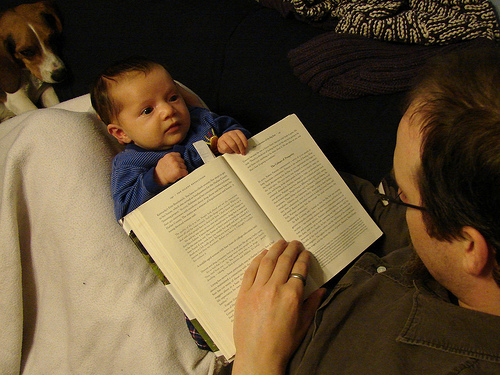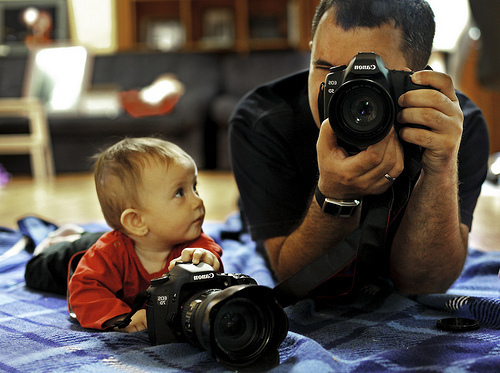Ten Amazing Literary Names For Future Bookish Babies
Image via Flickr
It's a truth universally acknowledged that most of us would much rather raise lovers than fighters. What better way to ensure this than to honor your favorite characters from some of history's most romantic literature?
Get inspired by our list of beloved authors, characters and muses who will surely win your affection throughout the ages. "What's in a name?" Juliet Capulet asked, to which we answer, "More than the usual suspects." Here are ten literary-inspired picks for baby bookworms.
GIRLS:
Matilde (German for “Mighty battler”): Hail to the woman who inspired one of the greatest love poets to ever grace this earth: Pablo Neruda. Though Matilde Urrutia began as the Chilean poet’s secret mistress, she quickly grew into his worshipped muse. While guys can get tongue-tied over a simple “hello”, Matilde’s very existence managed to bust this gem out of her man: “I want/To do with you what spring does with the cherry trees.” Dads, get your shotguns ready.
Bridget Allworthy (Celtic for “power, strength and virtue”): Out of all of the bawdy players in Henry Fielding’s The History of Tom Jones, perhaps the purest traits can be found in Miss Bridget Allworthy. An “old maid” by 15th century standards, Miss Bridget’s scholarly wisdom, quiet wit and pious upbringing managed to win the heart of the weathered Captain Blifil– despite some serious baby mama drama several hundred pages later. Though Bridget is a brief character, her public impression is lasting, respected and inspiring.
Cécile de Volanges or Cecilia (Latin for “blind one”): It’s a little hard to find a decent character in Les Liaisons Dangereuses, but it’s also hard to omit Pierre Choderlos de Laclos’ most scandalous work. While perversion and humiliation, rather than romance, drench this epistolary novel, the targeted Cécile de Volanges’ extreme naivete and innocence can almost be refreshing for jaded readers who find themselves constantly unlucky in love. For best results, take your parenting cues from more lit and less chick flick (it’s a little hard to forget Cecile Caldwell’s scene-stealing lip lock in the modern-day screen adaptation, Cruel Intentions.)
Elizabeth Bennet (Hebrew, via Greek, for “my God is an oath”): Who could resist the possibility of raising such a strong character? Elizabeth Bennet in Jane Austen’s Pride and Prejudice has opened up a delightful world to readers for 200 years. Intelligent, witty and sharp as a tack, Elizabeth’s hard exterior melts in the face of love, but not after testing her ridged convictions. Bonus: She LOVES her dad.
Scheherazade (Farsi for “city dweller”): While One Thousand and One Nights is a vast collection of global literature, one story consistently binds this book together: The wise queen of Persia, Scheherazade, cleverly avoided her execution by enticing her love-spurned king with colorful tales of adventure, romance, and even comedy. Her skilled storytelling stretched on 1,001 nights, securing not only her safety, but a lifetime of happily ever after.
BOYS:
Jacob (Hebrew for “the heel”): If you’re digging the name “Jacob” but swear it’s not because of Twilight, here’s an alternative tale with just as bite, straight from the Book of Genesis. Jacob fell hard for his cousin, Rachel, and worked seven hard years under her father for her hand in marriage only to have his bride switched out with her sister on the wedding day. Jacob then worked another seven years to finally marry his true love. Eventually going on to raise the Twelve Tribes of Israel, Jacob’s story may or may not have inspired Steve Martin’s role in Cheaper by the Dozen.
Westley (English for “from the West Meadow”): The dashing character Westley shines through both onscreen and on the page in William Goldman’s The Princess Bride. Starting off as a humble farm boy, Westley finds himself fighting for his life and love, thus growing into a skilled swordsman and sailor. This is a fortunate transformation which comes in handy when it is time to rescue his beloved Buttercup from outlaws, giants, rodents and magical terrain. May little Wes be blessed with just as much adventure, bravery and companionship.
Jay Gatsby (Sanskrit for “victory”): Say what you will about Jay Gatsby’s self-destructive illusions of his old flame, Daisy—his determined reinvention is no feat to be overlooked. Sure, he was a crime lord of sorts and sure, he and Daisy conspired as taken lovers, and unexpectedly, murderers. But that’s what parents are for, right? To lead impressionable young minds on the right path. And sure enough, though The Great Gatsby left the world ashamed of his roots, good ol’ papa Gatz was there to continue loving his child ‘til the very end.
Orlando or Roland (Italian for “famous throughout the land”): Orlando is the Ted Mosby of Shakespeare’s As You Like It. Strong, intelligent and capable, he’s an adoring underdog that will totally jump through hoops for his lady– from carving love letters in trees, to practice-wooing his new bro, who is actually the beloved Rosalind, dressed like a man. With such sweet words escaping his mouth (“Her worth, being mounted on the wind, Through all the world bears Rosalind”) no wonder he eventually finds his way his true love –and it didn’t take ten seasons to get there.
Rumi (Persian for “the Roman”): "Only from the heart can you touch the sky." Rumi can be strikingly obvious when it comes to life, love and interdimensional connectedness, which is something we all think about. This mystic poet’s devotionals are filled with tender wonder and awe toward the Beloved, or one’s Creator. Bringing full circle the goal of total spiritual fulfillment, Rumi’s work is known to promote treating your romantic partner as you would your Creator. His simple advice, however, does not touch on unconditional love during those raging teenage years.


